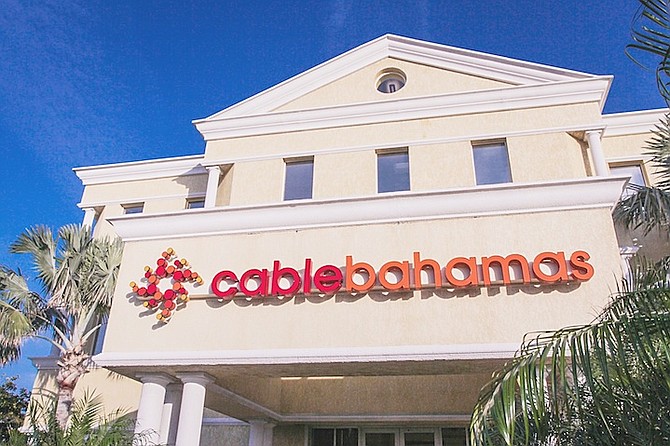
By NEIL HARTNELL
Tribune Business Editor
nhartnell@tribunemedia.net
A GOVERNMENT blunder has disrupted Cable Bahamas’ bid to appeal a regulatory decision forbidding it to broadcast an advertisement that allegedly defamed Philip Davis and the Progressive Liberal Party (PLP).
Justice Indra Charles, in an August 25 ruling, revealed that the BISX-listed communications provider was unable to follow the legally-established process for appealing decisions by the Utilities Regulation and Competition Authority (URCA) because the Government had failed to properly establish the body tasked with hearing such cases.
She disclosed that the Utilities Appeal Tribunal (UAT), a body vested with legal standing by its own Act, was “incompetent” to hear Cable Bahamas’ appeal against URCA’s advertisement bar because its members had not received their “instruments of appointment” from the Minnis administration.
And, with the Attorney General’s Office unable to advise when the UAT would be properly formed, Cable Bahamas elected to pursue a Judicial Review challenge to URCA’s decision given that its appeal will be rendered moot by this Thursday’s general election and cessation of all related advertising by that date.
Given the urgency, and blunder over the UAT, Justice Charles gave permission for Cable Bahamas’ Judicial Review to proceed to a full hearing on the merits of the case that is due to take place today with time rapidly running out ahead of the September 16 general election.
“The applicant (Cable Bahamas) has explored the correct avenue by appealing the decision of the Respondent to the Utilities Appeal Tribunal (UAT),” Justice Charles wrote. “That said, the fact that the Utilities Appeal Tribunal is not functional is a concern to the court.
“It makes this case an ‘exceptional’ one warranting the court to exercise its discretion to grant leave to apply for Judicial Review. It is meaningless that approval has been given for the appointment of the members and officers of the UAT, but they have not yet received their Instruments of appointment and are not presently competent to hear appeals.
#“It has been nearly a month that the applicant has lodged an appeal against the decision to the UAT. The appeal should have been given priority given that the general election is on 16 September, 2021.”
Cable Bahamas, in appealing URCA’s order that it cease broadcasting the advertisement complained of by Mr Davis and the PLP, is seeking a Supreme Court declaration that the regulator’s action was unlawful under the Communications Act 2009 as well as “arbitrary, irrational, oppressive. unlawful and unreasonable”.
It also asserted that URCA’s action was unconstitutional, with its decision “taken in bad faith” and representing “an intentional and/or malicious failure and/ or refusal to perform its statutory duty”.
The BISX-listed communications provider is seeking unspecified exemplary and aggravated damages, along with “vindicatory damages” for URCA’s alleged unlawful interference within its legal, constitutional and due process rights.
Justice Charles, setting out the background to the dispute, suggested that Cable Bahamas initially had doubts about running the advertisement in question. This was because it had informed URCA in July 15, 2021, that the Public Communications Agency had made a complaint against it for rejecting the ad on the basis that it ‘bordered on defamation’.
URCA then received the complaint from Mr Davis and the PLP alleging that Cable Bahamas was in breach of the regulator’s Revised Code of Conduct for content regulation by broadcasting what they claimed was a defamatory and slanderous advertisement. They also alleged that the advertisement breached the code because it failed to state it was political and “on whose behalf it was run”.
“Given the complaint received from Mr Davis and the PLP, URCA alleges that, despite its initial rejection of the advertisement, Cable Bahamas had at some point revisited its earlier decision and determined to run the advertisement,” Justice Charles noted.
“Cable Bahamas says that it is not running that particular advertisement and provided to the court a version of the advertisement in question.” URCA nevertheless ordered Cable Bahamas on July 22 to cease broadcasting it on the basis that it may breach the Code and cause “serious and irreparable harm”.
However, the day after its appeal was lodged on July 28, Cable Bahamas “was advised by the Office of the Attorney General that although approval has been given for the appointment of the members and officers of the UAT, they have not yet received their instruments of appointment and are not presently competent to hear appeals.
“URCA says that, whilst this may be so, there is a registrar in place who is functioning. As it presently, stands, the UAT is incompetent to hear Cable Bahamas’ appeal which was filed almost a month ago. Further, the Attorney General was unable to advise Cable Bahamas as to a timeline for the regularization of the UAT to become functional.”
This was despite the Minnis administration having almost four-and-a-half years to properly appoint the UAT and its members. With the UAT route blocked off, Cable Bahamas instead filed for Judicial Review.
John Wilson QC, for URCA, argued that Cable Bahamas’ appeal could not succeed on section 96 of the Communications Act as imposing an obligation on the regulator to say how long an interim order would last would render the law “unworkable”.
But Quincy Parker, acting for Cable Bahamas, said the advertisement ban “failed to comply with the spirit and letter” of section 96, which required that interim orders be “limited in time” and only address those acts likely to result in “serious and irreparable harm”.
“According to him, the interim order failed to provide a reasonable and lawful basis for the determination that the issuance of the interim order was warranted due to the risk of serious and irreparable damage (harm) to the character and reputation of Mr Davis and the PLP,” Justice Charles wrote.
“Mr Parker emphasizes that URCA failed to provide Cable Bahamas with a reasoned basis for its decision to issue the interim order and, instead, merely regurgitated the general premises of the complaints made by Mr Davis and the PLP…..and in no way demonstrated how Cable Bahamas’ conduct posed a credible, or any discernible risk in that regard.”
Finding that there was “an arguable case that Cable Bahamas was not afforded due process, and the decision itself may have been taken without proper regard for URCA’s obligations to Cable Bahamas or the principles of natural justice”, Justice Charles said the failure to properly appoint the UAT had created sufficient “exceptional circumstances” for the case to proceed.
“In the present case, if the appeal to the UAT is not heard promptly and urgently, it may defeat the whole purpose. Political advertisements after a general election are moot,” she added.
“Therefore, it was incumbent upon URCA to urge the UAT to act quickly to hear Cable Bahamas’ appeal. It has been a month and Cable Bahamas has had no indication when its appeal will be heard, if at all.
“The members of the UAT are nominated but they have not received their instruments of appointment. To emphasize, Cable Bahamas has first attempted to exhaust its alternative remedy by way of appeal to the UAT but that body is not properly constituted and therefore incompetent to hear and determine this matter.
“The Attorney General was unable to advise Cable Bahamas as to a timeline when the UAT would be able to be properly constituted. In the circumstances, I agree with Mr Parker that, at present, there is no viable remedy to deal with Cable Bahamas’ appeal urgently, and consequently Cable Bahamas had to make the present application to the court.”







